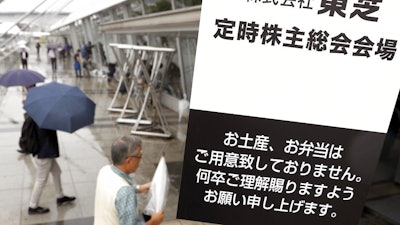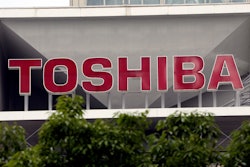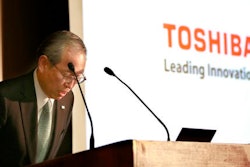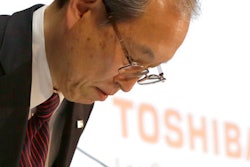
TOKYO (AP) — Toshiba Corp. said Wednesday it is suing its joint venture partner Western Digital over the U.S. company's opposition to a plan to sell the Japanese electronics and energy giant's memory chip unit.
Toshiba said in a statement that it was seeking a permanent injunction and 120 billion yen ($1.1 billion) in damages for what it called interference in the effort to sell Toshiba Memory Corp.
Financially strapped Toshiba needs the cash from selling its flash memory unit to survive, but Western Digital contends its Japanese partner has no right to sell the memory chip unit without its consent.
Such sales can be sensitive because they involve the transfer of valuable technology.
Western Digital owns some SanDisk chip operations including the joint venture in Japan with Toshiba. It has submitted its own bid for the memory chip business, but last week Toshiba announced it had chosen a consortium led by a Japanese government-backed fund and Bain Capital Private Equity LP as the preferred bidder.
There was no immediate comment from Western Digital as 140-year-old Toshiba convened a shareholders meeting Wednesday outside Tokyo.
Toshiba had said it hoped to reach agreement with the consortium on the proposed 2 trillion yen ($18 billion) sale before that meeting. But earlier in the day it said negotiations were taking longer than expected.
The lawsuit Toshiba filed in Tokyo District Court contends that Western Digital has exaggerated its right to a say in the planned sale.
"WD's claims are false, designed only to interfere with the sale process, and have damaged Toshiba and TMC (Toshiba Memory Corp.)," Toshiba said in a statement.
It also accused Western Digital of "improperly obtaining" trade secrets by transferring SanDisk employees holding confidential information into the U.S. company.
Toshiba's sprawling business includes everything from TV sets to high-speed trains. But the company's losses have mounted in recent years, and its U.S. nuclear unit Westinghouse Electric Co. filed for bankruptcy protection in March.
In 2015, Toshiba acknowledged it had been systematically falsifying its books since 2008, trying to meet overly ambitious targets. An outside investigation found profits had been inflated and expenses hidden across the board.
Toshiba risks having its shares delisted and is facing an Aug. 10 deadline for getting auditors to sign off on its long-delayed earnings.
The company's nuclear business is in deep trouble: Reactors that Westinghouse is building in the U.S. are still unfinished, partly because of beefed-up safety regulations following the 2011 Fukushima nuclear disaster.
Toshiba, is also responsible for decommissioning of Fukushima Dai-ichi nuclear plant, where three reactors suffered meltdowns after a massive earthquake and tsunami.






















